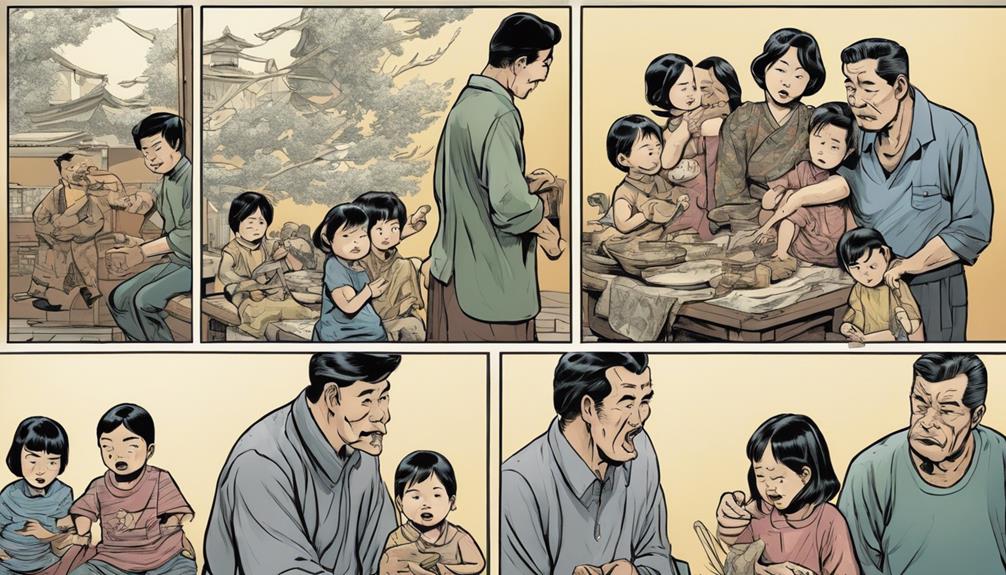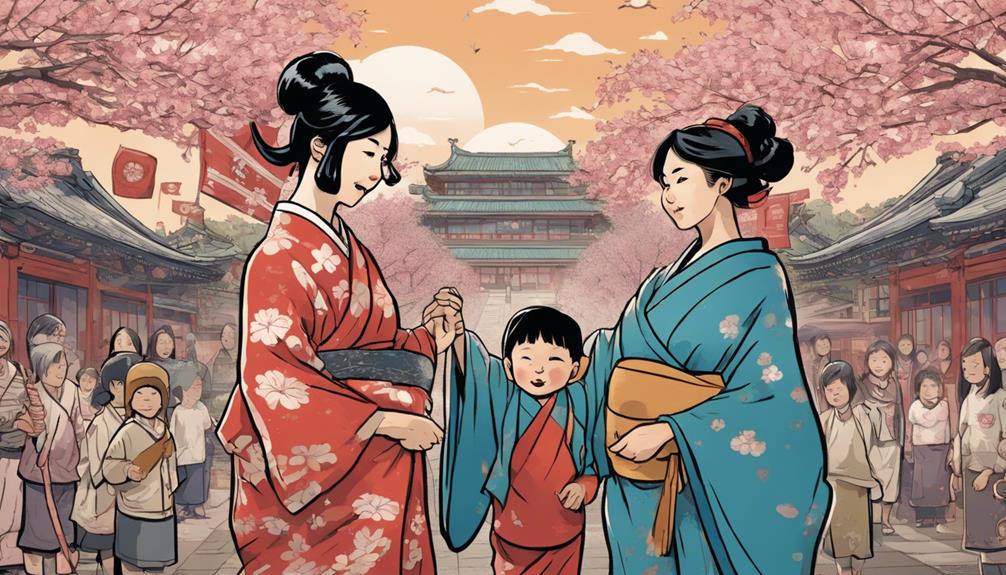Discovering the different ways Asian **vs** Western parents raise their kids reveals how their values shape their methods. Asian parents focus on **harmony**, high grades, and following rules, using strict techniques that emphasize obedience. Western parents, however, prize **individuality**, emotional support, and personal freedom, using more of a team approach with **open conversations**. Understanding these philosophies highlights the parenting strengths and pitfalls. See how these styles impact discipline, independence, and self-esteem, uncovering the intricate job of raising adaptable and aware children.
Key Takeaways
• Asian parenting prioritizes academic achievement, filial piety, and respect for authority, whereas Western parenting values individuality and emotional support.
• Asian parents often use authoritarian parenting with strict rules, while Western parents emphasize positive reinforcement and open communication.
• Western parents encourage creativity through unstructured time and experimentation, whereas Asian parents focus on obedience and respect for authority.
• Asian cultures emphasize discipline and hard work to achieve academic success, whereas Western parents focus on holistic development and individuality.
• Blending Asian and Western parenting styles can raise adaptable, culturally aware children who excel academically and emotionally.

Prevent Teach Reinforce for Young Children: The Early Childhood Model of Individualized Positive Behavior Support
As an affiliate, we earn on qualifying purchases.
As an affiliate, we earn on qualifying purchases.
Understanding Cultural Ideals
When you explore the world of parenting, you'll find that Asian and Western cultures uphold distinct ideals that shape their parenting styles. These cultural ideals play a vital role in how parents raise their children, ultimately impacting their emotional development, academic success, and social skills.
In Asian parenting, filial piety, collectivism, and academic success are deeply ingrained cultural ideals. In contrast, Western parenting values individuality, emotional support, and personal expression. Understanding these cultural ideals is essential in recognizing the strengths and challenges of Asian and Western parenting styles.
By acknowledging these differences, you'll gain insight into how parents prioritize their children's needs, discipline, and educational goals. For instance, Asian parents often prioritize academic achievement, while Western parents focus on fostering emotional intelligence.

hand2mind Express Your Feelings Sensory Bottles-Primary Emotions, Quiet Toddler Fidgets for Classroom, Calm Down Corner Supplies, Social Emotional Learning, Sensory Toys for Kids with Autism
PRESCHOOL CLASSROOM MUST HAVES: The Express Your Feelings Sensory Bottles offer a quiet, tactile way for children to…
As an affiliate, we earn on qualifying purchases.
As an affiliate, we earn on qualifying purchases.
Parenting Philosophies Compared

Both Asian and Western parenting philosophies take distinct approaches to child-rearing, reflecting fundamentally different values and priorities that shape their parenting styles. As you delve into the world of parenting, it's essential to understand the underlying philosophies that drive these approaches.
Here are some key differences between Asian and Western parenting philosophies:
- Academic emphasis: Asian parents prioritize academic achievements, often pushing their children to excel in school, while Western parents focus on individuality and self-expression.
- Cultural values: Asian parents often prioritize respect for elders and authority, while Western parents encourage autonomy and personal growth.
- Parenting style: Asian parents may utilize an authoritarian parenting style, using fear, guilt, and obligation tactics to instill discipline, whereas Western parents emphasize positive reinforcement and open communication.
- Emotional support: Western parents tend to prioritize emotional support and nurturing, whereas Asian parents balance traditional values with modern ideals.
Understanding these philosophical differences can help you navigate the complex world of parenting and appreciate the cultural foundations of parenting styles.

Assessing English Language Learners: Bridges From Language Proficiency to Academic Achievement
As an affiliate, we earn on qualifying purchases.
As an affiliate, we earn on qualifying purchases.
Discipline and Authority Dynamics

As you explore the differences in discipline and authority dynamics between Asian and Western parenting styles, you'll notice that respect for authority figures plays a significant role in shaping the way parents interact with their children.
Asian parents, for instance, are often seen as the ultimate authority, with strict rules and high expectations guiding their children's behavior.
In contrast, Western parents tend to adopt a more collaborative approach, encouraging open communication and nurturing emotional support to foster a stronger bond with their kids.
Respect for Authority
In Asian cultures, strict authority figures instill respect through unwavering rules and high expectations, shaping a distinct parent-child dynamic that contrasts sharply with Western parenting values.
You may notice that Asian parents are often seen as the ultimate decision-makers, with their rules and expectations being non-negotiable. This approach instills a strong sense of respect for authority in their children.
Here are some key aspects of respect for authority in Asian parenting:
- Strict rules: Unwavering rules and expectations are set to maintain discipline and respect.
- High expectations: Parents have high expectations for their children's behavior and achievements.
- Ultimate decision-makers: Parents are seen as the ultimate authority figures, with their decisions being final.
- Respect through discipline: Discipline is often used to instill respect for authority, which shapes the parent-child dynamic.
This cultural emphasis on respect for authority influences children's behavior and values differently in Asian and Western parenting styles.
While Western parenting values autonomy and individuality, Asian parenting prioritizes respect for authority and discipline.
Discipline Techniques
How do cultural beliefs about authority and respect influence the discipline techniques used in Asian and Western parenting styles?
You may be surprised to learn that the approaches differ to a large extent.
In Asian parenting, discipline techniques often involve strict measures, such as physical punishment like hitting with a stick. This reflects the high respect for parental authority, where rules are non-negotiable and obedience is paramount.
In contrast, Western parenting tends to focus on alternative methods like grounding or time-outs, prioritizing emotional development and self-control over physical punishment.
The contrast in discipline techniques between Asian and Western parenting styles reflects differing cultural beliefs about authority, respect, and child-rearing practices.
While Asian parents prioritize respect for authority, Western parents focus on instilling resilience and emotional intelligence.
Understanding these differences can help you navigate the complexities of parenting and make informed decisions about the best approach for your child.

Positive Discipline: The Classic Guide to Helping Children Develop Self-Discipline, Responsibility, Cooperation, and Problem-Solving Skills
As an affiliate, we earn on qualifying purchases.
As an affiliate, we earn on qualifying purchases.
Nurturing Independence and Creativity
As you explore the nuances of nurturing independence and creativity in children, you'll notice a stark contrast between Asian and Western parenting styles. While Western parents tend to encourage self-reliance and problem-solving skills, Asian parents often prioritize obedience and respect for authority.
Now, let's examine how these differing approaches impact a child's ability to think creatively and make decisions independently.
Encouraging Self-Reliance
You might be surprised to learn that Asian parents often prioritize obedience and respect for authority over nurturing independence and creativity in their children. This approach can limit opportunities for children to develop self-reliance, an essential life skill.
In contrast, Western parents tend to prioritize fostering independence, critical thinking, and creativity in their children.
Here are some key differences in how Asian and Western parents approach encouraging self-reliance:
- Autonomy vs. Authority: Asian parents often emphasize respect for authority, while Western parents encourage children to think for themselves.
- Decision-Making: Western parents are more likely to let children make their own decisions, while Asian parents may make decisions for their children.
- Risk-Taking: Western parents tend to encourage children to take calculated risks, while Asian parents may be more cautious.
- Exploration: Western parents often give children the freedom to explore their own interests, while Asian parents may dictate activities.
Teaching Problem-Solving Skills
By fostering a culture of creative problem-solving, Western parents empower their children to navigate complex situations with confidence. This contrast in approach affects the way children develop problem-solving skills.
Western parents encourage children to think critically and come up with their own solutions, whereas Asian parents often prioritize rote memorization and rule-following over independent thinking. Asian parents might focus on memorization and repetition, impacting a child's ability to adapt to new situations and think creatively.
While academic success is important, prioritizing it over problem-solving skills can limit a child's independence and creativity. By teaching problem-solving skills, Western parents cultivate independence and critical thinking in their children, leading to better adaptability and resilience in the long run.
Fostering Creative Freedom
Western parents, who value nurturing independence, encourage children to make decisions and explore their interests freely, fostering an environment that promotes creative freedom and individuality. This approach allows children to think outside the box, take risks, and develop problem-solving skills.
In contrast, Asian parents tend to prioritize discipline and adherence to rules, which can stifle creativity and innovation.
To foster creative freedom, consider the following strategies:
- Provide unstructured time: Allow children to explore and express themselves without strict guidelines or expectations.
- Encourage experimentation: Support children in trying new things, even if they might fail, to develop their problem-solving skills.
- Offer open-ended materials: Provide materials that allow children to express their creativity, such as art supplies or building blocks.
- Emphasize the process over the product: Focus on the creative journey rather than the end result, promoting a growth mindset and creative freedom.
Shaping Self-Worth and Identity

Frequently, the way parents shape their children's self-worth and identity reveals fundamental differences between Asian and Western parenting styles. Asian cultural values, which emphasize humility and respect, influence the way Asian parents shape their children's self-worth and identity. They often prioritize academic achievements as a key factor in shaping their children's self-worth and identity.
In contrast, Western parents focus on fostering individuality, self-expression, and autonomy to build a child's sense of self and identity. They prioritize emotional support, open communication, and personal growth to help children develop a strong sense of self-worth and identity. You may notice that Western parents encourage their children to express themselves freely, whereas Asian parents may emphasize obedience and respect for authority.
These differing approaches reflect fundamental cultural values and beliefs about self-worth and identity development. As you explore the differences between Asian and Western parenting styles, it becomes clear that shaping self-worth and identity is a critical aspect of parenting, with each approach yielding unique outcomes.
Academic Success and Pressure

As you consider how parents shape their children's self-worth and identity, you'll notice that academic success and pressure become a focal point, revealing stark contrasts between Asian and Western parenting styles.
Asian parents often prioritize academic achievements, emphasizing the importance of education for future opportunities. This can lead to high expectations, intense competition, and a strong emphasis on performance outcomes. In contrast, Western parents tend to focus on promoting their child's self-esteem, individuality, and personal interests over academic success alone.
Here are some key differences in approaches to academic success:
- Prioritizing education: Asian parents consider education a key factor in securing a better future, while Western parents balance academic success with personal interests and emotional well-being.
- Expectations and pressure: Asian parents often have high expectations, leading to intense pressure on children, whereas Western parents tend to focus on holistic development.
- Cultural values: The emphasis on academic achievements in Asian cultures reflects the importance of hard work, discipline, and respect for authority, whereas Western cultures value individuality, creativity, and emotional intelligence.
- Holistic development: Western parents prioritize their child's emotional well-being, allowing them to pursue their passions, whereas Asian parents may prioritize academic success over personal interests.
These differing approaches to academic success reflect fundamental differences in cultural values, beliefs, and priorities in shaping children's educational experiences and future opportunities.
Raising Global Citizens

How can you strike a balance between the discipline and respect for authority emphasized in Asian parenting and the individuality and emotional support fostered in Western parenting to raise a well-rounded global citizen?
By understanding the cultural values and beliefs that shape parenting approaches, you can blend the strengths of both styles to foster children's development. Asian parents often prioritize academic success, respect for authority, and a sense of duty towards family and community, while Western parents emphasize individuality, personal expression, open communication, and nurturing emotional support.
By combining these approaches, you can raise children who are adaptable, culturally aware, and respectful of diverse perspectives. This balanced approach will help your child develop into a global citizen, equipped to navigate the complexities of an interconnected world.
Frequently Asked Questions
What Is the Parenting Style in Asian Culture?
You'll find that in Asian culture, parenting style emphasizes filial piety, respect for elders, and collective family values.
Strict rules, high academic expectations, and a focus on discipline and obedience are common. Parents are seen as ultimate decision-makers with authority that's highly respected.
The goal is to shape responsible, hardworking individuals with a strong sense of duty towards family and community. This approach values hierarchy, duty, and instilling moral values in children.
How Cultural Differences Affect Parenting Styles?
As you explore the world of parenting styles, you'll find that cultural differences play a significant role in shaping the way parents raise their children. You'll notice that cultural values, such as collectivism and individualism, influence discipline strategies, communication styles, and expectations.
For instance, Asian cultures often emphasize respect for authority and academic success, while Western cultures prioritize individuality and emotional support. These differences have a profound impact on child development, making it essential to understand the cultural context of parenting.
What Is the Difference Between Asian and American Parents?
You'll notice that Asian and American parents have distinct approaches to raising their kids. Asian parents prioritize academic achievement and obedience, using stricter discipline and emphasizing respect for authority.
In contrast, American parents focus on individuality and self-expression, encouraging autonomy and open communication. These differences reflect fundamental cultural values, with Asian parents emphasizing collectivism and filial piety, while American parents value independence and personal growth.
What Is the Difference Between Chinese and American Parenting Styles?
You might be wondering, what's the difference between Chinese and American parenting styles?
Research suggests that Chinese parents prioritize respect for authority, obedience, and academic success, often using strict discipline to achieve these goals.
In contrast, American parents value independence, creativity, and individual expression, focusing on nurturing emotional bonds with their children.
These differing approaches reflect fundamental cultural values and societal norms, shaping child development in distinct ways.
What are the key differences between Asian and Western parenting styles?
When it comes to parenting, american vs chinese parenting differences are apparent. Western parenting tends to focus on fostering independence and individualism in children, while Asian parenting places a strong emphasis on respect for authority and academic achievement. These cultural differences result in varying approaches to discipline, communication, and expectations for children.
Conclusion
As you reflect on the cultural contrast between Asian and Western parenting styles, consider this striking statistic: in South Korea, where education is paramount, 75% of students attend private academies, known as hagwons, outside of regular school hours, often until midnight.
This stark difference in approach raises important questions about what it means to be a good parent and how cultural values shape our understanding of childhood and success.









